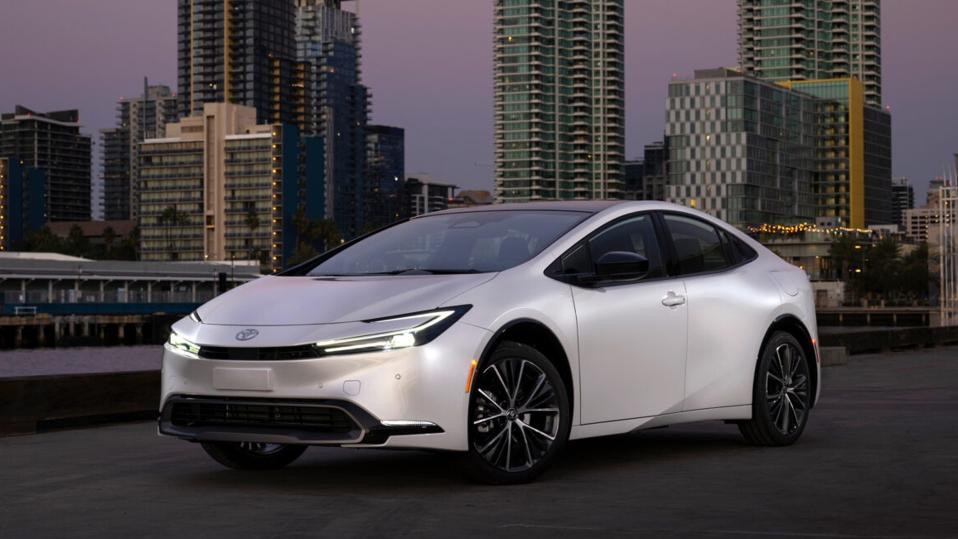For years the accepted wisdom in the auto industry seemed to be that an all-electric future would happen sooner rather than later, with new EV sales seeming to back that up with a whopping 47% increase in sales during 2023. Unfortunately, the segment’s momentum slowed to a proverbial snail’s pace as we entered 2024, with deliveries to customers in the U.S. advancing by just 2.7% in the first quarter of the year. That’s about half of the average 5% boost among all makes and models.
Analysts fear there aren’t enough mainstream buyers right now to in fact bring EVs into the mainstream, with environmentally-focused early adopters accounting for most sales thus far. It also didn’t help that a wave of bad press seemed to hammer at the genre’s drawbacks at year’s end, particularly with regard to range anomalies and a limited (not to mention unreliable) public charging network.
Here Come The Hybrids
However, within the same time frame sales of less-expensive hybrid-powered models began going gangbusters among those looking to save money at the pump and/or reduce their carbon footprints, but without having to commit to a much-costlier full-electric ride.
Toyota, whose executives had been criticized for not going all in on EVs, instead sticking for the most part with hybrids, is coming up roses with sales of its electrified fleet (which includes one full EV) rising by 36% in the first quarter. Even better, Ford posted a 42% increase in its hybrid sales, which include the gas/electric versions of its compact Maverick and full-size F-150 pickup trucks.
For 2024, the model that’s estimated to deliver the best fuel economy among all conventional gas/electric hybrid vehicles is again the Toyota Prius, with an EPA-rated 57 mpg in the city and 56 mpg in highway driving for its most-efficient variant. The EPA estimates a 2024 Prius will cost an average $900 to drive 15,000 annual miles, which would save the average owner $4,500 over five years compared to the average new vehicle.
How They Work
For the uninitiated, hybrid-powered vehicles use a conventional gasoline engine as the primary source of power, with one or more electric motors augmenting the gas engine as needed to maximize acceleration or fuel economy. A hybrid’s battery pack is self-charging, recovering energy that would otherwise be lost via braking and decelerating by a process called regenerative braking, which means it never has to be plugged in to operate, with its range only limited by the amount of gas in the tank. What’s more, a hybrid automatically powers down the engine at idle–when a car essentially gets zero miles per gallon–to further preserve fuel.
While most hybrid cars, trucks and SUVs still carry price premiums over standard-powered models, that gap has been shrinking steadily, with some mainstream models now at comparative levels. For example, the aforementioned Toyota Prius starts at $27,950, which is substantially less than the national new-vehicle average of nearly $48,000. The Ford Maverick’s hybrid variant is base priced at only $25,315.
There are also a number of what’s called plug-in hybrids with larger battery packs that enable them to operate for an extended period solely on electric power, which can be anywhere from less than 10 miles to 40 or more per charge. Once the battery is depleted, the vehicle continues to operate as a regular hybrid under a combination of gas and electric power. Unfortunately they’re costlier still—as an example, the plug-in Toyota Prius Prime starts out at around $5,000 more than the standard version. We’ll take a look at those in a future post.
Most Bang For The Buck
These are the 10 conventional hybrid-powered cars and SUVs for 2024 with the highest EPA fuel economy ratings, and the lowest starting MSRPs (manufacturer’s suggested retail price, less destination charges, fees and taxes) with estimated annual fuel costs noted for each.
- Toyota Prius: 57/56 mpg; $900 annual fuel cost; MSRP: $27,950.
- Hyundai Elantra Hybrid: 51/58 mpg; $950 annual fuel cost; MSRP: $26,250.
- Kia Niro: 53/54 mpg; $950 annual fuel cost; MSRP: $26,940.
- Toyota Camry Hybrid: 51/53 mpg; $1,000 annual fuel cost; MSRP: $28,855.
- Toyota Corolla Hybrid: 53/46 mpg; $1,000 annual fuel cost; MSRP: $23,500.
- Hyundai Elantra Hybrid: 49/52 mpg; $1,000 annual fuel cost; MSRP: $26,250
- Hyundai Sonata Hybrid: 44/51 mpg; $1,100 annual fuel cost; MSRP: $30,800.
- Kia Sportage Hybrid: 42/44 mpg; $1,200 annual fuel cost; MSRP: $28,590.
- Toyota Corolla Cross Hybrid: 45/38 mpg; $1,200 annual fuel cost; MSRP: $28,220.
- Toyota RAV4 Hybrid: 41/38 mpg; $1,300 annual fuel cost; MSRP: $31,725.
Source: EPA. Annual fuel cost estimates are based assuming 15,000 miles driven in 45% city and 55% highway use with gas at an average $3,38 for regular-grade gas.

